An otherwise auspicious birth in 1875 brought forth into the world Aleister Crowley who defied all acceptable standards of his time. His arrogance matched his defiance and bordered on grandiose. He founded the religion of Thelema, practiced sex magic, and may have worked as a double agent for the British. Based on the legends about Crowley, it would be easy to sum him up as the perverse, drug-addicted, satanic, wickedest man in the world. However, it seems that he was much more than any one of those things. Exactly who was Aleister Crowley – the person who could evoke respect and devotion in some people but disgust, hatred, and fear in others?
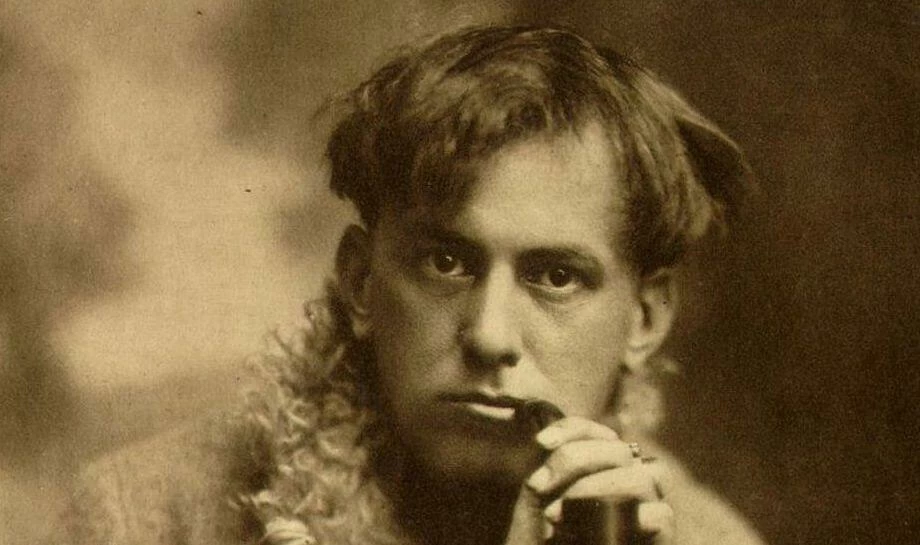
Aleister Crowley during his days at Cambridge. Source: Mike McClaughry.
Early Years
Edward Alexander Crowley, better known as Aleister, was born in Warwickshire, England, on October 12, 1875. His parents were Edward and Emily Crowley, both devout Christians. His father was a preacher and raised Aleister as a Christian. In fact, Edward read to him and his mother from the Bible every day after breakfast. Thus, from a young age, Aleister was admittedly a Christian as well.
Although Crowley adored his father, his relationship with his mother was difficult at best. She was exceedingly strict in a puritanical sense and called him “The Beast” whenever she was unhappy with his behavior. But he appeared to revel in this association rather than resent it. In fact, later in life, Crowley would refer to himself as “The Great Beast 666.”
After his father died of tongue cancer, Crowley, only 11 years old at the time, found his oppressive home too much. He strayed from his Christian path beginning with rebellious behavior at his conservative Christian school. Around the age of 16, he began an intense spiral into deviancy. To affirm his explicit defiance, young Crowley was intimate with the maid at his house on his mother’s own bed. After the maid’s termination, this woman worked as a prostitute and became a raging homeless alcoholic. There is also an unsubstantiated claim that she ended up as a victim of Jack the Ripper. (Erkan).
Aleister’s Large Inheritance
Aleister’s father spent much of his time preaching the Bible to whoever would listen, but he was also a certified engineer. Edward had inherited a fortune from his father’s (Aleister’s grandfather) lucrative family-owned brewing company. The company, Crowley’s Alton Ales, has since closed its doors, but the bottles from its lager of years gone-by fetch a pretty penny on the antiques’ market.
Edward saved his money in a trust for Aleister that he could access once he reached the age of twenty-one. Some sources say that the amount was £30,000, while others say it was £50,000 or even £100,000. His family’s network and wealth granted Aleister membership into some of London’s most exclusive fraternal clubs. By most standards, his inheritance should have been enough to set Aleister up for life. However, due to his lavish travel and spending, he exhausted the money before he was fifty.
In 1899, Crowley moved to Scotland where he felt a deep spiritual connection to the place. He bought the Boleskine House on the famous lake, Loch Ness, to perform ceremonies in which he would summon angels. Although the house was only in his possession for fifteen years, it was a site of much of his writing.
Esoteric Organizations
Ordo Templis Orientis (O.T.O), originally began as an offshoot of Freemasonry. Although Crowley was not the founder, as many people think, the group admitted him in 1910. He subsequently held a number of high ranking positions throughout his life. Crowley’s ideas highly influenced the direction of the organization, and within two years, they elected him to control the English and Irish chapters. Crowley compiled his esoteric research and beliefs into a number of books that the clergy of the O.T.O. revered as a godsend.
During his time in organizations like the O.T.O. and Order of the Golden Dawn, Crowley encountered much dissension. Part of his difficulty resulted from his arrogance and personality stemming from his need to demonstrate his defiance. However, his divergent libertine philosophies about homosexuality and morality were unacceptable for many people at the time. Additional issues about unfair promotions by senior members also proved problematic, and when he divulged the secrets of the Golden Dawn, they were outraged.
Thelema
Crowley also created a religion that he called Thelema. His brainchild, The Book of the Law, served as its holy text. The primary message of the writing is, Do what thou wilt shall be the whole of the Law. According to Crowley, this means that when a person acts in alignment with his true self or his true will, his expression in the world will be love and peace. Unfortunately, many people interpreted this to mean anything goes. He added, “Love is the law,” “Love under will.”

Crowley’s symbol of Thelema. Public domain.
Crowley’s Thelema was an amalgamation of deep eastern philosophy blended with the magic of the Qabbalah and other western concepts. He also incorporated ideas from Tantric sex regarding altered states of consciousness and the use of an array of psychedelic drugs and sex for enlightenment.
Family and Works
While Crowley did lead a morally divergent lifestyle, some say that he was not all bad. One good thing he did was save his wife from an arranged marriage. Rose Edith Kelly was supposed to marry another man when Crowley asked her to elope. However, it soon became far more than a marriage of convenience when he fell in love with her. Both of them shared a fascination with the occult. They even honeymooned in Cairo and spent their wedding night in the King’s Chamber of the Great Pyramid. This marriage was, however, not a happy one. Although Rose gave Aleister two children, their oldest died of typhoid. Deeply affected, Crowley blamed Rose. Subsequently, the couple divorced in 1909 and she suffered severe bouts of alcoholism.
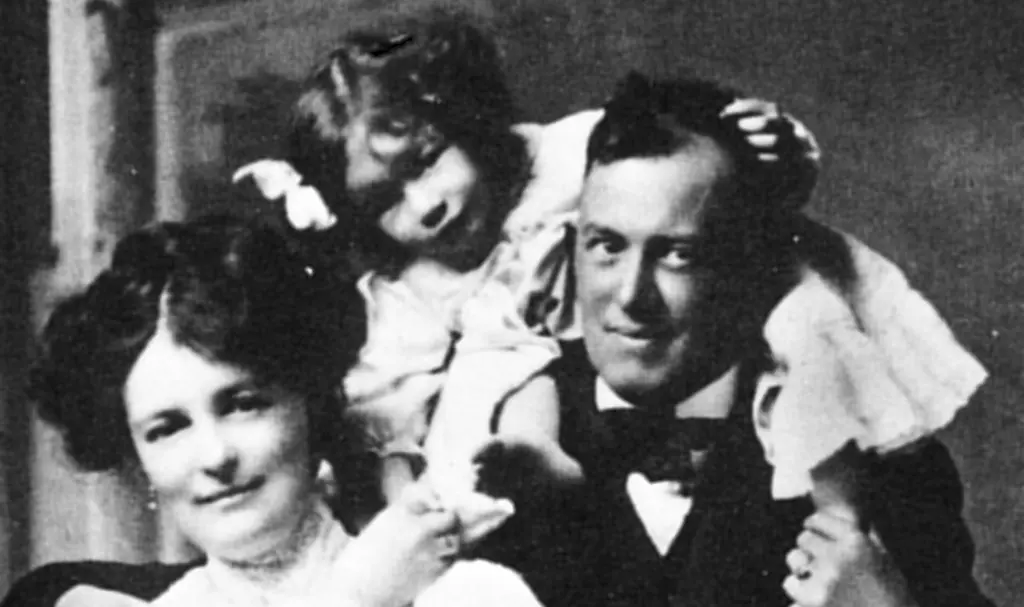
Crowley with his ex-wife Rose and their daughter in 1910. Public domain.
Although one might classify Crowley’s family life as turbulent, he wrote copiously during that time period and beyond. Most of his works are undoubtedly masterful. He crafted numerous books on various topics and complex alliteration and rhythmic patterns in his poetry. Additionally, he left behind many letters and journals. Scholars of Thelema still study these texts for meaning in the present day.
Abbey of Thelema
In 1920, the same year Hitler founded the Nazi party and a year after Mussolini established the Fascist party, Crowley rented a house in Cefalù on the island of Sicily in Italy. The old house perched on the side of a mountain in the middle of a grove of olives and offered a quiet and peaceful setting. Crowley turned the house into the Abbey of Thelema, where he and his disciples could practice yoga, meditation, sex magick, and other rituals.
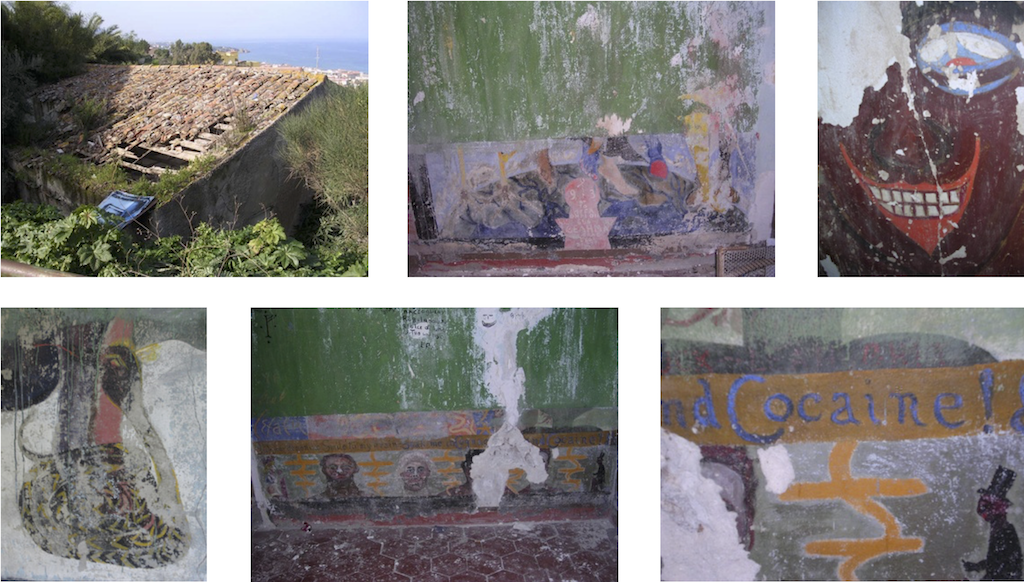
Crowley painted the inside of the temple area of the Abbey of Thelema. Few images remain. CC2.0 Inventati.
Three years later, Mussolini kicked them out of the country for their occult activities and rumors that they had performed blood sacrifices (later, a woman would testify that they had killed a cat once during a ritual). The woman responsible for the immediate exposé had gone to the Abbey with her husband although she hated Crowley. After her husband died there from drinking contaminated river water, she told the media a variety of slanderous stories. One of those was that her husband died because he was forced to drink cat blood. Worldwide newspapers caught the sensational news and spread the tales of his “evil.” This coverage laid the foundation for many of the myths and rumors that would later spring up about Crowley’s avant-garde behavior.
Aleister Crowley the Spy?
Throughout his life, people accused Crowley of working for a number of government agencies. This would have explained why he constantly traveled to so many countries and why certain diplomats attended some of his hasheesh orgies.
During some of his trips, at least on the surface, he was accomplishing many things. When he camped out on Esopus Island on the Hudson River, he meditated and translated the Tao Te Ching. At other times, he practiced the occult, yoga, and sex magic. Other trips involved mountain climbing.
According to Richard Spence’s extensive research into the subject of Aleister Crowley’s connection to government intelligence agencies, Crowley worked as a double agent during WWI for the British government. This leads many people to theorize that he continued his deep undercover role for much of his life. Thus, his time spent in Russia may have been operational. His time in the U.S. may have been instrumental in pulling the U.S. into the war for the British. It seems that he may have also made connections with German spies in the U.S. Likewise, the pro-Irish/anti-British articles and propaganda that Crowley wrote may have helped Crowley secure Germany’s trust during WWII.
The following image is an extract from a document that Mike McClaughry (here’s his blog) acquired from the National Archives at College Park, Maryland. An intelligence officer at Westpoint, New York, drafted the report to Director of Military Intelligence in Washington in 1918 “after a US probe for German spies,” c. 1916.
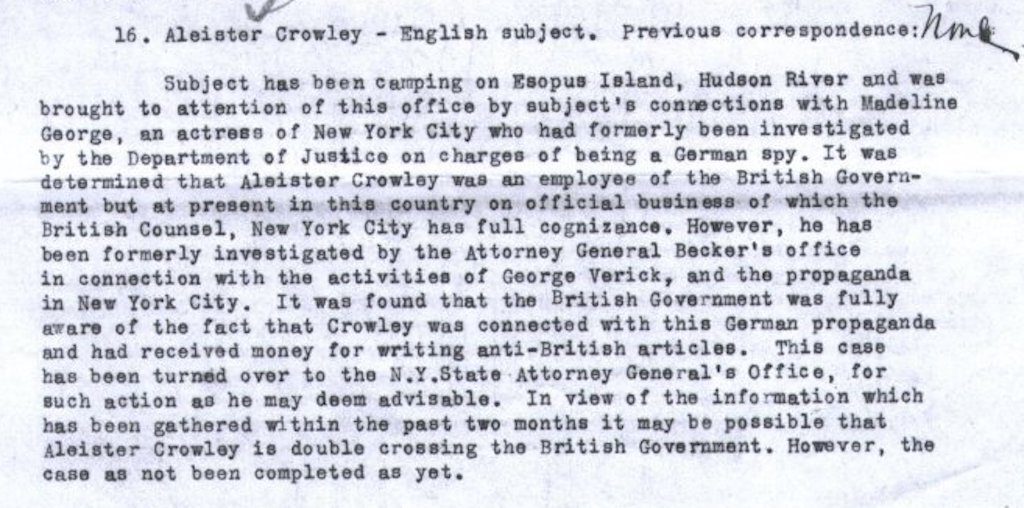
This extract of a report drafted after an investigation into possible German spies suggests that Crowley may have been working as a double agent. Source: Mike McClaughry.
The Nazi Connection
As a result of Crowley’s vocal political views and publicity stunts, rumors spread purporting his ties to the Nazis. Rudolf Hess, Adolf Hitler’s Deputy Führer, was the second-highest-ranking Nazi in history. He possessed an active interest in clairvoyance and the occult, and even his colleagues thought of him as odd. In March 1941, he entered a cockpit and flew a solo mission without warning to the United Kingdom. Running out of fuel over Scotland, he ditched his Messerschmitt Bf 110 by way of a parachute and was subsequently captured. There are many theories and some claim that he wanted to make peace with Britain, but no one really knows for sure why he would undertake such a strange stunt. It is curious though that “Rudolf Hess later admitted in all seriousness that ‘the idea has been inspired in him in a dream by supernatural force'” (Booth).
During this time, Crowley was living in London, and when the Blitz began, he moved down to Torquay, a seaside town on England’s coast. In 1939 when the Second World War broke out, he contacted the Naval Intelligence Division offering his services. Supposedly they denied his proposal, but throughout the war, people saw him in the presence of Britain’s senior intelligence community. Some even claim that he gave Churchill the “V for Victory” idea (Booth). This, of course, has never been substantiated. Some speculate that Crowley had been in contact with him for some time prior to this event.
Many conspiracy theories exist. Could Crowley have prompted and negotiated a defection by Rudolph Hess? Did he somehow hex the man? Although Crowley was not officially in Scotland at the time, it is not impossible that Hess may have thought that he was. On the other hand, perhaps Hess was simply forced to land out of necessity. Analysis of the wreck did show a virtually empty fuel tank.
The Mountaineer
Although his occult activities dominated his image, Aleister Crowley had many other interests. Mountain climbing became a hobby during his time at Cambridge, and throughout his life, he summited a surprising number of perilous peaks. In fact, he was so enthralled by the hobby that between 1894 and 1898, he holidayed to the alps every year to climb. He was also an original member of the Scottish Mountaineering Club. During his life, Crowley climbed K2, the Bernese Alps, and the Monch, just to name a few. He even climbed the Eiger solo.
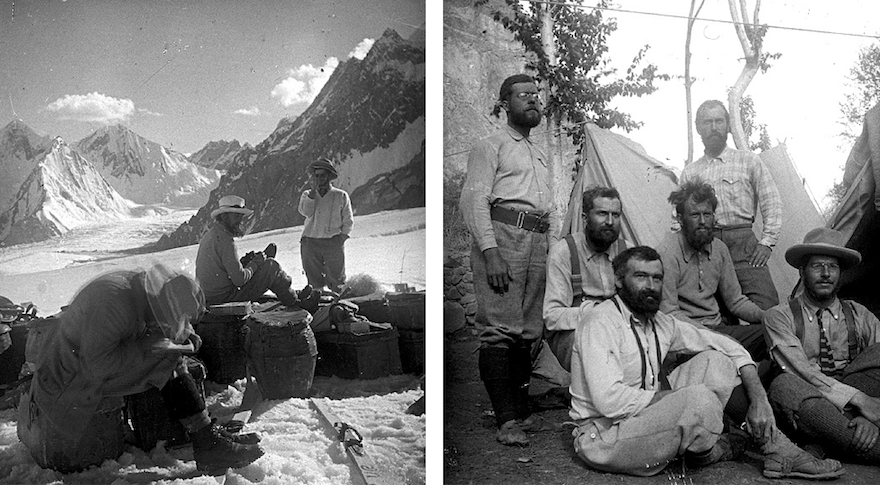
K2 expedition of 1902. (L) Crowley wearing hat at basecamp. (R) Crowley, middle row right. Public domain.
The Kanchenjunga Expedition of 1905 was also an unfortunate circumstance that permanently damaged his reputation in the climbing community. Kanchenjunga in the early 20th century was the Everest of its time. The peak was not reached until 1955, but in 1905, Crowley was offered the position of sole leader for an expedition to break the altitude record.
Crowley was a stubborn and cruel leader by all accounts. Forcing the team to push regardless of poor weather, half the team chose to attempt a descent. Due to the poor weather, they had become entrenched and were crushed by an avalanche. When the others rushed to help those trapped under the snow, Aleister refused to assist them. The whole expedition was called off and the next day Crowley left on his own. He gave up climbing that day.
In addition to climbing, Crowley was an avid chess player. At one point he was the captain of the Cambridge University Chess Team and even considered becoming a professional player for a time.
A Poorly Ending
Who was Aleister Crowley? Have we misunderstood him, or was he just that complex? Although incredibly perverse and often outrageous, he was a strangely prolific individual. It appears that he used “The Beast” persona to symbolize his anti-Christian philosophy as the antithesis to Christ. However, it is likely that his view of the biblical Satan differed from his own view of what he called “Satan.” His occult persuasion involved a combination of Paganism and eastern philosophy more so than satanism. In fact, he may be responsible for the Pagan revival.
Many people would say that his writings attest to his extremely high level of intelligence. His impact on culture is undeniable, whether it be the myriad of rock and heavy metal bands from Black Sabbath and Led Zeppelin or cultural revolutions like the hippie movement. Some organizations today still use parts or all aspects of the teachings Crowley left behind.
A conspiratorial spy narrative will continue to be one of the most mysterious aspects of Aleister Crowley’s life. With a combination of political intrigue and mastery in the occult, he was in many ways like the Rasputin equivalent of his day. Nonetheless, drug addictions led to his ruin. This shocking man of the 19th century died a pauper, alone in a halfway house in 1947. The cause of death was a combination of ailments from a lifetime of drug abuse and chronic untreated diseases.
The week after his death, Time Magazine published a short commentary about him. We leave you with an excerpt:
“He became a fat, olive-skinned man with heavy jowls and mean little eyes which made him look like a stockbroker when the market is bad. He was crushed to hear himself described one day as a ‘harmless old gentleman.'”
References:
Booth, Martin (2000). A Magick Life: The Biography of Aleister Crowley. London: Coronet
Books. ISBN 978-0-340-71806-3.
Encyclopedia Britannica. “Aleister Crowley | Biography, Teachings, Reputation, & Facts.” 2017.
Erkan. “The Most 10 Of Everything.” The Most 10 Of Everything, April 9, 2018.
Maier Files Series. “ Did Crowley Interrogate Rudolf Hess? | Maier Files Series.” 2019.
Spence, Richard B. Secret Agent 666: Aleister Crowley, British Intelligence and the Occult. Port Townsend, Wa: Feral House, 2008. Amazon affiliate link above.
Time Magazine. “Rascal’s Regress.” December 15, 1947 issue.
Whyte, William. “The Great Beast 666: Who Was Aleister Crowley?” National Trust. 2019.